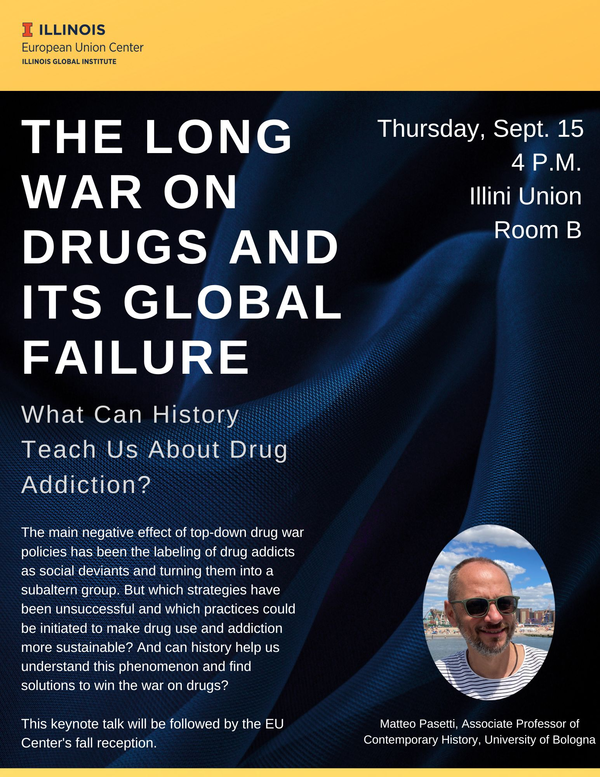The Long War on Drugs and Its Global Failure: What Can History Teach Us about Drug Addiction?

- Sponsor
- European Union Center
- eucenter@illinois.edu
- Views
- 139
Launched on a global scale more than a century ago, the war on drugs is still ongoing and does not seem to be near an end. On the contrary, in recent decades a new paradigm of drug use/abuse has caused a new health and social emergency in many countries around the world by incorporating a perspective that include NGOs, health personnel, and victims of the drug trade. Increasingly, there are calls to recognize that the international drug regulatory regime of the twentieth century failed to stop an explosive increase in the trade and consumption of illegal drugs. The main negative effect of top-down drug war policies has been the labeling of drug addicts as social deviants and turning them into a subaltern group. But which strategies have been unsuccessful and which practices could be initiated to make drug use and addiction more sustainable? And can history help us understand this phenomenon and find solutions to win the war on drugs?
About the speaker:
Matteo Pasetti is Associate Professor of Contemporary History at the Department of Philosophy and Communication Studies, University of Bologna, where he teaches History of Mass Communication and History of Journalism at the School of Arts, Humanities, and Cultural Heritage. He is a member of the editorial boards of several scientific journals and he is the author, among other publications, of the books Tra classe e nazione. Rappresentazioni e organizzazione del movimento nazional-sindacalista, 1918-1922 (Carocci, Roma 2008), Storia dei fascismi in Europa (Archetipolibri, Bologna 2009), and L’Europa corporativa. Una storia transnazionale tra le due guerre mondiali (Bononia University Press, Bologna 2016).
His research deals with twentieth-century European history and, more specifically, the history of fascism by a comparative and transnational approach. In this field of studies, his interests include the issues of memory and public use of the past after dictatorships. He is also interested in the evolution of mass communication, public spheres, and circulation of ideas from a global perspective. His current work focuses on the topic of drug consumption in the last decades of the twentieth century as a socio-historical phenomenon.